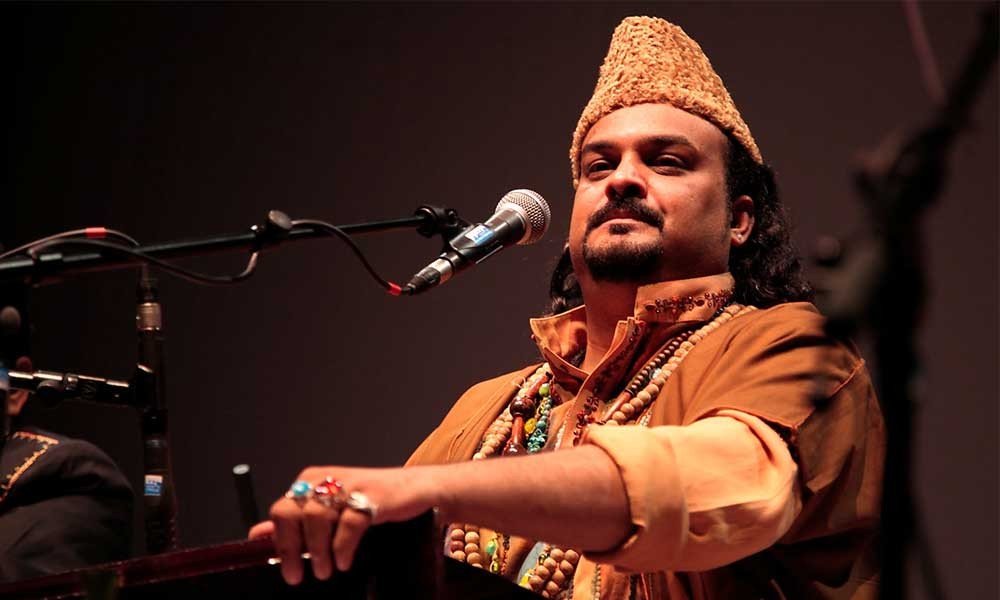
It seems copyright laws for music are invoked only when a film becomes a hit or if the violator does not know how to defend himself

Adnan Sami Khan sang for a Salman Khan film after nearly a decade, veteran Bollywood actor Naseeruddin Shah appeared in the music video of Shafqat Amanat Ali Khan, and Noman Farooqi sang Peera Ho as cover for Jami’s Moor to be released this week. For a layman, it seems more of a revival of Pakistani singers than the film industry but there lies a catch -- none of the songs sung by these singers was original. Adnan Sami’s Bhar Do Jholi has been sung on a number of occasions by other qawwals, Shafqat’s Dil Dhadakne Ka Sabab was first sung by Ghulam Ali whereas the Khalid Anum version of Peera Ho remains under his copyright.
It seems that copyright is not a concern for some musicians on either side of the Wagah border. Amjad Sabri -- son of Ghulam Farid Sabri and nephew of Maqbool Sabri (the Sabri Brothers) -- has the right to sing the kalaam that he believes belongs to his family for seven generations. But does he have the right to sing Mohammad Rafi’s qawwali Parda Hai Parda from Amar, Akbar, Anthony or even Sonu Nigam’s Tum Se Milke Dil Ka Hai Jo Haal from Main Hoon Na? The latter was sung by Hashim Sabri and Altaf Sabri and certainly not Amjad so why does he keep singing these songs in his concerts when they aren’t his. In fact, he has been found to shake a leg on a number of occasions on morning shows on songs that aren’t even related to a Sabri.
Adnan Sami Khan has termed this as ‘personal gain’ in a recent interview where he claimed that the daughter of one of the Sabris thanked him for singing his father’s work in a Bollywood film. Adnan Sami told the interviewer that he doesn’t care whether another family member has an issue because he is not the musician of the song (Pritam is), and the daughter seems to have given the go-ahead.
Veteran actor/musician Khalid Anum’s rendition of Peera Ho during the 1990s made it popular for the new generation. He never claimed it to be his work but that of Saeen Akhtar whose ancestors had sung the song for centuries. The song has been sung by newcomers after getting permission for Khalid Anum who confirmed while talking to TNS that he did not need money from the producers for using his song, just the credit.
"For us, Babia is a song by Sajjad Ali, not Khaled Didi; Bolo Bolo is Sajjad’s rendition not ABBA’s. Similarly, before I had sung Peera Ho, not many knew about it and that’s the reason my arrangement and rendition brought it alive. I have always been chill about the song, regarded it is sung after asking for permission because that’s the way things are done. I was hurt when the makers of Moor thought of including Noman Farooqi’s cover of Peera Ho in their soundtrack without my permission," says Anum.
The song was eventually dropped from the soundtrack after Khalid Anum’s outburst on social media but he said the matter had been resolved and they could use the track. "Faisal (Kapadia) called me up and apologised for using the song without my approval and since he has been a friend for a long time, I accepted his apology. He even asked me if I could tell them the name of the lyricist and I told him the song wasn’t written by me (the lyricist remains unconfirmed) but the modern version was composed by myself."
As for the last song Dil Dhadakne Ka Sabab, Shafqat sang it since he claimed it was sung by his father and if we apply the Amjad Sabri logic, it should have remained with the family for seven generations. However EMI, the once-audio giants in Pakistan, claim the song was first sung by Ghulam Ali in the early 1980s, followed by renditions from Madam Noor Jehan and Salamat Ali.
Seems EMI has a point but one that was ignored when Farida Khanum and Asha Bhosle sang Sohail Rana’s composition Aaj Janay Ki Zidd Na Karo from Badal Aur Bijli? Did they send a notice to these singers for violating copyright because, to this day, Sohail Rana claims that he wasn’t asked. On his last visit to Pakistan, Rana was angry on the usage of Hum Mustafavee Hain and Ko Ko Ko Rina by film and ad makers, but did EMI or others raise a question then? No they did not because film and ad makers are more powerful in Pakistan than the copyright laws which seem to either come into play when a film gets successful (in case of Bajrangi Bhaijan) or if the opponent is someone who doesn’t know how to defend himself (Shafqat Amanat Ali).
Whoever comes out the victor in this war of ‘copyrights’, the laws must be applied equally to all. Using it for cheap publicity should not be promoted. From the few interviews conducted above, it appears as musicians on this side of the border have a big heart and would settle for credit rather than cash. Bollywood filmmaker Subhash Ghai told this scribe when he came to Pakistan, "We shouldn’t copy songs when you can ask the very artist to come to your country and perform. That’s why we got hold of Reshma for Hero and look at the result; the song Lambi Judaai is now part of folklore because the vocals of Reshma were used for it, rather than someone else trying to emulate the nightingale of the desert." Touché sir!